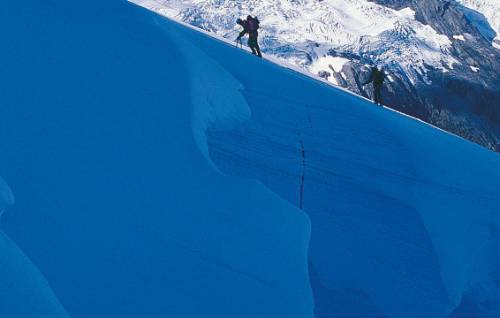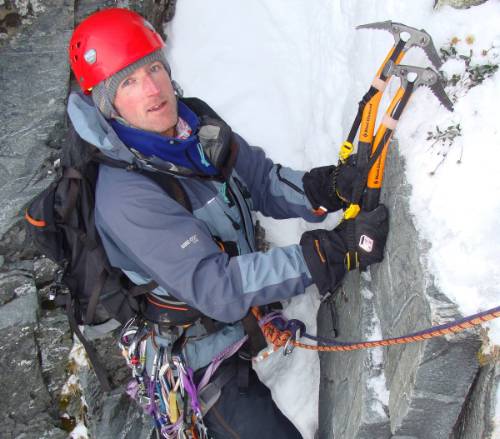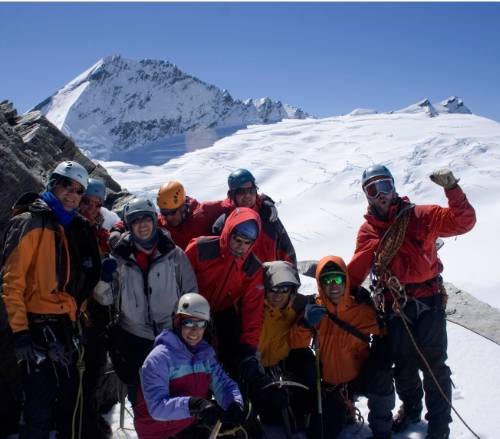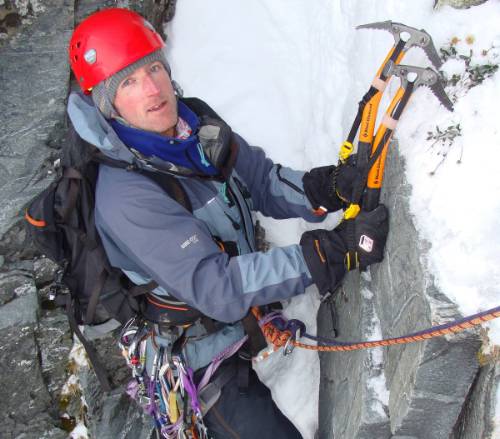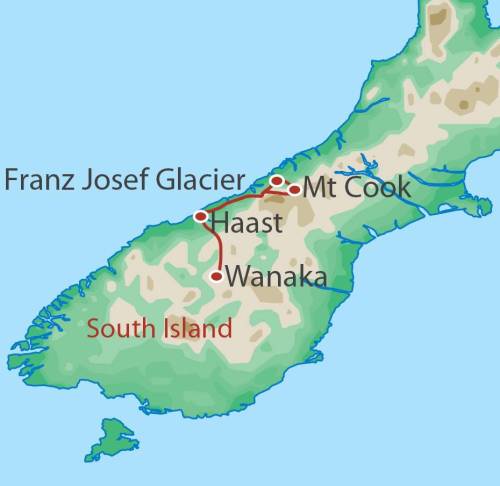Alpine Climbing Course
Alpine Climbing Course
$2910
Tour Overview
Embark on a thrilling 7-day Alpine Climbing Course in the breathtaking landscapes of New Zealand's Aoraki Mount Cook National Park. This adventure is perfect for those eager to learn or refine their mountain skills under the guidance of fully qualified IFMGA/NZMGA guides. You'll stay in high mountain huts, with the possibility of bivouacs, as you gain hands-on experience climbing various alpine routes. The course covers essential skills such as rope and anchor techniques, glacier travel, and avalanche awareness, all while fostering camaraderie with fellow climbers. Enjoy the unique opportunity to fly in and out of the mountains by helicopter or ski plane, and immerse yourself in the world of snow and ice climbing. With all meals, accommodation, and climbing gear included, this course offers an ideal introduction to alpine climbing, ensuring you leave with newfound confidence and skills. ...more ...less
Highlights
Itinerary
Day 1 : Meet at Aoraki Mount Cook Village, fly to the mountains
Location: Aoraki Mount Cook Village
Accommodation Name: Mountain Hut
Meals Included: Breakfast, Lunch, Dinner
Today you'll meet your guide and other group participants at 8.30am in Aoraki Mount Cook Village for a briefing. After everyone is introduced, your guide will outline the course syllabus and confirm the actual venue where course will take place, which will depend on conditions. There will be time together to discuss and then organise our personal and group equipment (bring all your gear with you, including those items you are not sure whether to include or not). Equipment pertinent to the course will be discussed and you can get all the advice you need concerning equipment from the guides. Anyone requiring rental equipment will be fitted at this time (but please advise in advance of your requirements to ensure you are catered to) and final purchases can be made. Food is pre-sorted for the trip by the guides to save time. It's very important to ration food effectively, too much and your packs become overly heavy, too little and you starve! Basic rope skills and tying in are covered to ensure consistency and revision for those who already have rope skills. This enables us to get right into it when we reach the mountains. Trip planning is covered followed by rescue first aid and decision-making. Once all this is completed we pack up for the trip. Excess items can be left at our office for storage. You will then take your helicopter or ski plane flight into the mountains, taking in the awesome peaks of the region you will be soon scaling. The fly in is generally planned for late morning, or early afternoon. After landing, it may be a short stroll across to your hut - or you may need to rope up for glacier travel and haul your gear and food for up to 30 minutes to the hut. Our guide will welcome you to your mountain home for the week and introduce you to "hut etiquette'. An initial familiarisation talk to clarify nomenclature and identify the peaks will help you absorb this wonderful environment before moving into the more practical elements of the trip. We utilise the hut system in the region when they are not too full and we move our gear in before we sort ourselves to get out onto the snow. The group ropes up for crevasse travel training and we go for a walk on the glacier. Our other mountaineering gear is introduced as we go along with the rudimentary techniques needed for mountaineering - use of an ice axe, learning to crampon and to self-arrest. The first day out in the mountains is always exciting and eventually we will retire to the hut for a team cook-up and maybe a lesson on weather forecasting while watching the sunset.*Please note you will need to arrive in Aoraki Mount Cook Village the day before the trip starts as day 1 will be an early start. ...more ...less
Day 2 - 6 : Mountaineering, alpine climbing course
Location: Aoraki Mount Cook National Park
Accommodation Name: Mountain Hut
Meals Included: Breakfast, Lunch, Dinner
Your course will be based from one of several mountain huts across Aoraki Mount Cook National Park. The venue used for each course is selected by your guide, based on upcoming weather and general snow conditions. Some of the options include Barron saddle, Grand Plateau or Tasman saddle. The itinerary is flexible and strikes a balance between instruction and climbing, with building core competencies and skill development at the core. Once the key self arrest and crampon skills are instilled, the focus moves to climbing, rope and anchor skills, glacier travel and mountain weather, fostering the confidence to undertake climbing trips in glaciated alpine zones. Expect early mornings with 'alpine starts' if a longer ascent is planned for the day and to be active for at least 8-10 hours a day. There will be time in crevasses to practice rescue skills, where we each take turns to jump into the crevasse while our climbing partners hold our falls. They then carefully pull us up out of the crevasse then we swap around. There will be time spent ice climbing, with the chance to hang onto those tools and find the balance point on the crampons. Navigation is a crucial skill and can mean the difference between comfort and concern in the mountains. By knowing these skills one can actually avoid ever getting (completely) lost. Weather lessons, avalanche awareness lectures, time to practice placing and equalising snow, ice and rock anchors and discussions on crevasse rescue theory is all included, with a balance between theory and practical skills. There will be opportunities for the course participants to consolidate the skills acquired under the watchful eyes of the guides. Mountain weather conditions will govern our activities for the day, with instruction closer to the hut in poor weather. A welcome cup-a-tea greets you at the hut after each challenging yet rewarding day out, expect to return to the hut tired and elated, then it's time for a game of cards before dinner. The time in the mountains provides the perfect introduction to the world of alpine climbing in glaciated terrain.
Day 7 : Navigation, climbing and return Aoraki Mount Cook Village
Location: Aoraki Mount Cook Village
Accommodation Name: Mountain Hut
Meals Included: Breakfast, Lunch, Dinner
There are opportunities to utilise our navigation skills and it's a good chance for the course members to practise these skills. Generally we will hike down the Tasman Glacier for about 8 km to be picked up by the aircraft from the White Ice area (weather permitting). You must always be prepared and fit enough to walk out if weather conditions will not allow for aircraft pick-up. Weather must also be suitable to allow safe travel on foot. Depending on the hut used, the walk may take anywhere from 4-9 hours. Depending on our return timing, there may be a chance to practice some rock climbing on the local crags. By mid-afternoon everyone is rather tired, it’s been an action packed 7 days so it’s back to the office to sort out the equipment and debrief the course, after which our trip will conclude at around 5pm.
What's Included
-
Accommodation
6 nights mountain hut/camping -
NZMGA and / or IFMGA qualified mountain guide
The course includes instruction by fully qualified NZMGA and/or IFMGA mountain guides.
-
Helicopter or ski plane access and egress flights
Helicopter or ski plane flights for access and egress are included.
-
Group equipment
Group equipment such as ropes, tents, and stoves are provided.
-
Course manual
Participants receive a detailed course manual.
-
Department of Conservation fees
Department of Conservation fees are covered.
-
NZ Goods and Services Tax (GST)
The course price includes New Zealand Goods and Services Tax (GST).
-
Use of climbing gear
Climbing gear including harness, carabiners, belay device, prussics, slings, helmet, ice axe, ice hammer, and crampons are provided.
What's Not Included
-
Travel to/from Aoraki Mount Cook Village
Travel to and from Aoraki Mount Cook Village is not included.
-
Personal Expenses
Personal expenses are not covered.
-
Travel Insurance
Travel insurance is not included and is recommended.
-
Personal Mountaineering Equipment
Personal mountaineering equipment not listed in the inclusions is not provided but can be hired.
-
Unspecified Accommodation and Meals
Accommodation and meals not specified in the itinerary are not included.
Accommodation
6 nights mountain hut
We will provide your accommodation while the course is running which is from 8.30am on Day 1 until 5.00pm on Day 7. When in the mountains you will stay in mountain huts with shared bunkrooms and basic facilities. There are no single rooms available. Alpine huts are fitted with a water supply, bunks, mattresses, blankets, benches, cooking utensils and VHF radios. Most huts have solar powered lighting. Some huts have LPG gas, however most alpine huts in New Zealand are not heated. Warm jackets are recommended even in summer for the evenings, and be prepared for cool conditions during winter. Plates and cooking utensils are supplied, as is cooking equipment. It is a good idea to bring along your own drinking mug. Most huts have a small library of magazines and books, and you are welcome to bring along a book or lightweight reading device (with a dry-bag container). All participants are expected to assist with basic cooking and hut cleaning duties. Some mountain nights may be spent in tents or bivvies where you will be more exposed to the elements but the final decision on this will be made by the guides after weighing up all the factors.
...more ...less
What You Carry
A high level of aerobic fitness and tramping/hiking/bushwalking experience is expected. You will carry a 5-8 kg backpack each day and a heavier pack on longer days.
Grading
To make the most of your climbing experience we encourage you to work on your fitness prior to the trip. You will find that training with a 15kg + pack on is the best preparation for the mountains, with the aim of getting ‘pack fit’ and building your endurance. Your guide places special focus on fitness levels and will regulate the pace accordingly. Building up your upper body strength is imperative for ice climbing and some training beforehand will really help you make the most of you time on the course. Progressing to doing pull ups in the gym is what you need to aim for, and good overall conditioning will help you climb for longer each day on the course. Our registration form requests that you advise us of any medical problems you may have and if you are on any medication. Any information you supply will be treated as confidential. ...more ...less
Mode of Transport
The tour includes helicopter or ski plane flights for access and egress to the mountains. Travel to and from Aoraki Mount Cook Village is not included, and participants are responsible for their own transportation to the starting point.
Check out our Q&As
-
What kind of accommodation is provided during the Alpine Climbing Course?
During the course, accommodation is provided in mountain huts with shared bunkrooms and basic facilities. Some nights may be spent in tents or bivouacs depending on the conditions and decisions made by the guides.
-
What skills will I learn during the Alpine Climbing Course?
Participants will learn a variety of skills including basic rope skills, self-arrest, crampon techniques, climbing, rope and anchor skills, glacier travel, navigation, and crevasse rescue. The course also covers mountain weather and avalanche awareness.
-
Are meals included in the Alpine Climbing Course?
Yes, all meals and snack foods are included while on the trip.
-
What equipment is provided for the Alpine Climbing Course?
The course provides group equipment such as ropes, tents, and stoves, as well as climbing gear including a climbing harness with adjustable leg loops, carabiners, belay device/descender, prussics & slings, helmet, ice axe, ice hammer, and crampons.
-
Is travel to and from Aoraki Mount Cook Village included in the course?
No, travel to and from Aoraki Mount Cook Village is not included in the course.
-
What is the fitness requirement for the Alpine Climbing Course?
A high level of aerobic fitness and tramping/hiking/bushwalking experience is expected. Participants should be prepared to carry a 5-8 kg backpack each day and a heavier pack on longer days. Training with a 15kg+ pack and building upper body strength is recommended.
-
What happens if the weather conditions prevent the planned activities?
Mountain weather conditions will govern the activities for the day. In poor weather, instruction may take place closer to the hut. Participants must be prepared and fit enough to walk out if weather conditions do not allow for aircraft pick-up.
-
Who will be my travelling companions on the tour?
We have offices on three continents which means your travelling companions will be just that – international and wonderfully eclectic. Part of small group travel means that although travellers come from various locations and backgrounds, you will be travelling with like-minded companions who, like you, are keen to share the experience and forge lifelong friendships.
-
What about environmental impact?
We believe that adventure travel revolves around establishing a strong relationship with the people and environments in which we operate. Our responsible travel policies have been carefully developed to ensure that we minimise the impact of our presence and help to protect the regions we visit while contributing positively to the local community.
-
What should I pack?
Your pre-departure documents include a detailed packing list with items that you need to bring. While most of the equipment for daily activities is included in your tour cost, some items like helmets and hiking boots are best brought from home. The pre-departure documents also include information on layering and recommended brands for various items to ensure you are fully prepared for your trip.
-
Do you operate a “single share” option and how does it work?
Yes. World Expeditions does not require single travellers to pay a surcharge for travelling alone on the vast majority of our trips. Our holidays are primarily on a twin share basis, so if you are joining the group as a solo traveller, we will match you with someone of your own gender. The choice is yours however; if you prefer not to share, we do offer single supplements for private occupancy.
-
Are tips included in my trip price?
Tips are not included in the tour cost. Tipping is a personal thing, do not worry about how much, or when, to tip. Tipping guidelines are provided for certain destinations in our pre departure information upon booking, however the best advice will be provided by your tour leader.
-
Am I suited to small-group travel?
We recognise that many of our travellers have not been on a ‘group trip’ before. Yet what our departures provide is both structure and flexibility, allowing you plenty of freedom within the framework of the itinerary. You’ll find that with our maximum group size at 16, you’ll travel in a minimal impact style with a great group of like-minded travellers.
-
Can you advise which vaccinations are recommended?
While our pre-departure kit provides information on vaccinations, we suggest that you consult your doctor, local government inoculation centre or a travel medical specialist in order to get the most current advice regarding vaccination requirements.
Reviews from travellers on this tour
1 Select your preferred date
Book with Confidence
-
Transfer as credit to Future Tours
World Expeditions allows you to transfer existing payments to a future tour to avoid cancellation fees if you can't travel and inform world expeditions, 70 days before departure.
-
Low Deposit
World Expeditions requires a minimum deposit of 400 GBP per person or the full booking value, whichever is less, with the final balance not due until 70 days before departure.
-
Cancellation Policy
We don't charge a cancellation fee, here is a summary of world expeditions charges.
Up to 70 days before tour starts: Forfeit 100% of deposit.
At 69 days before tour starts: Forfeit 50% of booking price.
At 35 days before tour starts: Forfeit 100% of booking price.
Alpine Climbing Course
7 Days Starting and ending in Aoraki Mount Cook Village, New Zealand
Visiting: Aoraki Mount Cook Village, Aoraki Mount Cook National Park, Aoraki/Mount Cook National Park ...more ...less
Tour operator:
Tour code:
ACI
Guide Type:
Fully Guided
Group size:
3 - 8
